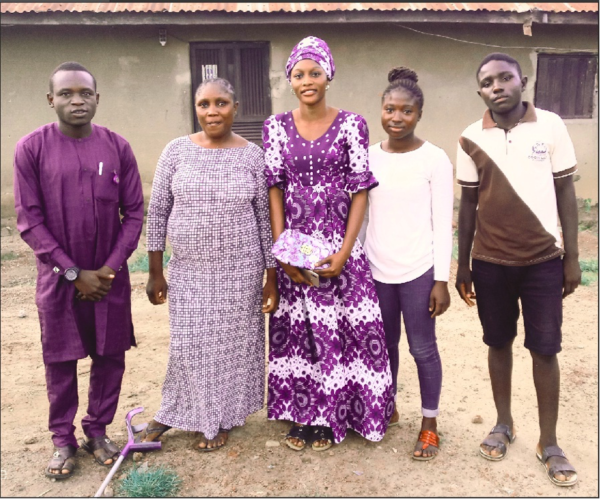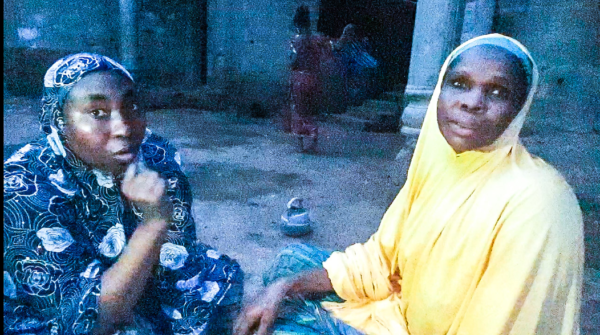COVID-19 lockdowns continue to impact the lives of everyone. In African economies, the women in informal economies have been the most affected with many of their businesses closing and others struggling to survive. In August this year, New Faces New Voices Nigeria conducted a study COVID-19 impact study featuring vulnerable women in marginalized communities in Katsina, Kaduna and Kano State Nigeria. This study was under the Ilizwi-Initiative as part of the Graça Machel Trust’s response to COVID-19. The study focused on the effects of the pandemic on the livelihood of women, their health and children’s education. The initial account featured stories from Kano State. This second edition features women from Kaduna and Katsina State.
39-year-old Ruth Zok is a mother of five living with a disability. She lost one if her children early this year. Before the pandemic, she worked in the Kampala cloth material making business. Due to COVID-19 lockdowns in Nigeria, Ruth was unable to sustain her business and used up all her capital and savings in feeding and buying medicine for her four children. Her children’s education was also affected but she recognises the government efforts to provide virtual classes through radio stations. Currently she fries dankali (sweet potatos) and akara (bean cake) to make ends meet.

Caption: Kaduna Field Assistant 1&2 with a beneficiary and her children.
Like Ruth, Hauwau Muhammad has also had to grapple with numerous losses in 2020. The 45-year-old mother of 9 from SabonGari area spoke about losing her husband and her bean cake baking business. “Coronavirus is really a disaster to remember. I lost my husband and used up the money from my business to buy food and look after my children“. The lockdowns also meant that her customers who used to come from neighbouring communities could no longer buy her beans’ cake. Her children’s education was also disrupted because schools shut down. “They do revisions at home which won’t help without progressing studies in school,” said Hauwau.
Amina Jumare is also a widow. The 53-year-old has 8 children and sells beans cake for a living. The profit she gets is spent on her children’s upkeep and education. Commenting on the effect of COVID-19 on her children’s education and health, Amina shared that their education had been affected by the school shutdowns and they were way behind. In terms of health, bouts of malaria and typhoid have seen her spend a lot of money in hospital paying bills and buying medicine. “I have had to reduce the volume of beans because even if I make the beans cake, people hardly buy all of it. Now I don’t even have money to continue my business.”
Amina Abdulqadir is 33 years and a mother of 7 who trades in groundnut cake, groundnut cake and popcorn at Batsari Local Government Area in Katsina state. “Before COVID-19, my business was running very smoothly and was able to cater for education and food. But now, everything has stopped. I don’t even have any capital. The situation is dire. We are struggling to survive and have to seek help to get medicine when any of the children get sick”.

Farida Abubakar Saulawa, NFNV-NIGERIA assigned Field Assistant with an interviewee.
Another mother of 7, Amina Sale, also comes from Katsina Local Government Area. She is a 41-year-old macro-entrepreneur producing and selling local yoghurt and milk candy treats. With this being her main source of income, she has been able to feed, clothe and educate her kids. However, COVID-19 has been a tough experience for her. “During the lockdown imposed because of coronavirus, we suffered a lot especially during the month of Ramadan. The business wasn’t selling and the capital was lost to purchase of food. It was so sad that I couldn’t buy even buy an Eid outfits for my children”.
“The fact that COVID-19 has resulted in the locking down of schools is saddening, I couldn’t afford the virtual lessons for my children. The little I earn from my local groundnut oil business goes directly to feeding my kids”. This is Hindatu Abdulrahman’s story. A 40-year-old mother of 7 from Katsina Local Government Area of Katsina State. “Even some big companies have witnessed a drop in sales so what of small businesses. However, since the restriction on movement is lifted and business has resumed, if I could get access to capital to invest, I will be able to retain my customers and expand my business”.
Editor’s Note: Through NFNV and its partners, some of the interviewers were beneficiaries of an N10,000 incentive to help with post-COVID business support which they were extremely grateful for and would boost their recovery efforts. Watch here to learn more.










 The Trust supports and mobilises civil society networks on issues of ending child marriage, ending violence against children, ending female genital mutilation and promoting children’s rights, to carry out advocacy and action across Africa. Special focus is placed on Malawi, Mozambique, Tanzania and Zambia where child marriage continues to be a problem largely driven by poverty, gender inequality, harmful traditional practices, conflict, low levels of literacy, limited opportunities for girls and weak or non-existent protective and preventive legal frameworks.
The Trust supports and mobilises civil society networks on issues of ending child marriage, ending violence against children, ending female genital mutilation and promoting children’s rights, to carry out advocacy and action across Africa. Special focus is placed on Malawi, Mozambique, Tanzania and Zambia where child marriage continues to be a problem largely driven by poverty, gender inequality, harmful traditional practices, conflict, low levels of literacy, limited opportunities for girls and weak or non-existent protective and preventive legal frameworks.




 Education is a fundamental right for all children, which is also a vehicle for social, economic and political transformation in communities, countries and the African continent at large. Recent studies indicate a lack of progress in some of the critical commitments aimed at improving education quality, access, retention and achievement, particularly for girls. In most African countries, girls may face barriers to learning, especially when they reach post-primary levels of education. By implementing multi-dimensional approaches to education which includes core education, personal development, life skills and economic competencies, the Trust partners with funding partners, governments, civil societies and the private sector to improve education access.
Education is a fundamental right for all children, which is also a vehicle for social, economic and political transformation in communities, countries and the African continent at large. Recent studies indicate a lack of progress in some of the critical commitments aimed at improving education quality, access, retention and achievement, particularly for girls. In most African countries, girls may face barriers to learning, especially when they reach post-primary levels of education. By implementing multi-dimensional approaches to education which includes core education, personal development, life skills and economic competencies, the Trust partners with funding partners, governments, civil societies and the private sector to improve education access.

 The Nutrition and Reproductive, Maternal, New-born, Child and Adolescent Health and Nutrition, (RMNCAH+N) of the Children’s Rights and Development Programme aims at promoting the Global Strategy for women, children and adolescents’ health within the Sustainable Development Goals (SDG) agenda. The strategy emphasises on the importance of effective country leadership as a common factor across countries making progress in improving the health of women, children and adolescents.
The Nutrition and Reproductive, Maternal, New-born, Child and Adolescent Health and Nutrition, (RMNCAH+N) of the Children’s Rights and Development Programme aims at promoting the Global Strategy for women, children and adolescents’ health within the Sustainable Development Goals (SDG) agenda. The strategy emphasises on the importance of effective country leadership as a common factor across countries making progress in improving the health of women, children and adolescents. Through its Early Childhood Development (ECD) plan, The Trust will seek to put into action the new science and evidence Report that was presented by Lancet Series on Good and early development – the right of every child. This will be achieved by mobilising like-minded partners to contribute in the new science and evidence to reach all young children with ECD. The Trust’s goal is to be a catalyst for doing things differently, in particular, to rid fragmentation and lack of coordination across ECD sectors. In response to evidence showing the importance of political will in turning the tide against the current poor access and quality of ECD. Even before conception, starting with a mother’s health and social economic conditions, the early years of a child’s life form a fundamental foundation that determines whether a child will survive and thrive optimally.
Through its Early Childhood Development (ECD) plan, The Trust will seek to put into action the new science and evidence Report that was presented by Lancet Series on Good and early development – the right of every child. This will be achieved by mobilising like-minded partners to contribute in the new science and evidence to reach all young children with ECD. The Trust’s goal is to be a catalyst for doing things differently, in particular, to rid fragmentation and lack of coordination across ECD sectors. In response to evidence showing the importance of political will in turning the tide against the current poor access and quality of ECD. Even before conception, starting with a mother’s health and social economic conditions, the early years of a child’s life form a fundamental foundation that determines whether a child will survive and thrive optimally.